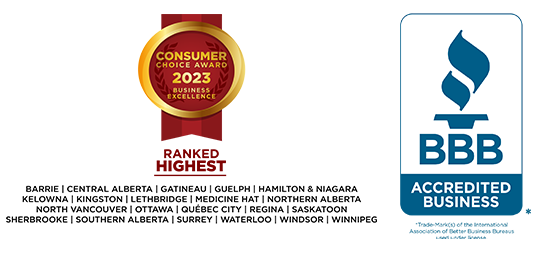12 Common myths of insolvency
There are a lot of misconceptions about insolvency. Whether it is simply a matter of misinformation, pride, or fear of the consequences, people are often reluctant to even look into working with a Licensed Insolvency Trustee on options like Bankruptcy or a Consumer Proposal.
If you’re experiencing significant financial challenges, insolvency may be a worthwhile path to consider. In order to establish what insolvency can do for you, it’s important to determine what insolvency does not do.
Let’s clear the air on 12 myths about insolvency to make way for more accurate information and a better understanding of the role of trustees and the insolvency process.

Myth #1: Declaring Bankruptcy means you will lose everything
Truth: In reality, insolvency laws in Canada protect essential assets such as vehicles, furniture, clothing, and work tools — as well as certain financial products. It is possible to keep these assets even if you declare Bankruptcy. The idea is not to impact your overall quality of life. In the event of Bankruptcy, insolvency laws will protect many of your best interests when it comes to living and working in the future.
Myth #2: Declaring Bankruptcy means you will never be able to obtain credit again.
Truth: Bankruptcy will have an impact on your credit score but the consequences are not as extreme and permanent as many people believe. Although your credit score is affected for a few years after Bankruptcy, it is possible to obtain credit again in the future. Licensed Insolvency Trustees can help point you in the right direction toward financial products available for people who have declared Bankruptcy and want to rebuild their credit score and get financial credit down the line.
Myth #3: Tax debts cannot be cancelled by Bankruptcy
Truth: In fact, tax debts can be cancelled by Bankruptcy or even a Consumer Proposal. You will be required to continue paying taxes that are given after your Bankruptcy has been filed, but all previous tax debts will be erased as part of your Bankruptcy.
Myth #4: Bankruptcy is a sign of poor financial management
Truth: Bankruptcy is not a reflection of your financial management skills. Many people and businesses find themselves in a challenging situation where Bankruptcy proves to be the best option. It can happen to anyone for many reasons such as illness, job loss, divorce, or other difficult situations. Poor financial management can contribute to Bankruptcy at times — which is why it’s always important to have ongoing financial planning in place — but Bankruptcy is not always the direct result of poor financial management.
Myth #5: You cannot declare Bankruptcy if you have a job or income
Truth: Having a job or any source of income is only one piece of your full financial picture. Anyone unable to repay their debts is in a viable position to declare Bankruptcy, whether they have an income or not. It is important to remember that each situation is unique and it is important to consult a Licensed Insolvency Trustee for specific advice and information on whether Bankruptcy makes sense for you and if you qualify based on your specific financial situation.
Myth #6: Student debts can never be cancelled in the case of insolvency
Truth: Student debts can be cancelled in the case of insolvency, but there are certain conditions to meet. For example, you must be out of school for at least seven years for your student loans to qualify as part of a Bankruptcy or Consumer Proposal. The good news is even if you have student debts that cannot be cancelled, you can still file for Bankruptcy or a Consumer Proposal if you and your Licensed Insolvency Trustee decide that’s the best course of action. Your student loans will remain, but they will likely be easier to manage with the other debt payments out of the way.
Myth #7: Bankruptcy is the only option when struggling with debt problems
Truth: Bankruptcy is one option if you are dealing with unmanageable debt, however, there are several other options available such as a Consumer Proposal, debt consolidation, or implementing a debt repayment strategy. All of your options have pros and cons suitable for certain scenarios. The most important thing is to determine what the best option is for you and your own financial situation.
Myth #8: Bankruptcy is always an easy option to get out of debt
Truth: While it is important to understand that Bankruptcy can be a viable option, it’s just as important to understand that Bankruptcy can have long-term consequences on your credit score and your ability to obtain financing in the future. A Licensed Insolvency Trustee will help you evaluate those consequences and weigh them against your other options, determining how to ultimately get you back on the path to financial freedom.
Myth #9: Consumer Proposals are always the best option for insolvency
Truth: Consumer Proposals can be an excellent option for some people, but they can also have some disadvantages. Once again, it is important to have the advice of a professional to evaluate all variables before making a decision. For example, they can take more time to pay off your debts than a Bankruptcy and they will also affect your credit rating. And if you still have a high income or significant assets, Bankruptcy may ultimately be a better option. Again, it’s important to determine what makes the most sense for you.
Myth #10: Once you have filed a Consumer Proposal, you cannot change your mind
Truth: You can withdraw your Consumer Proposal at any time before it is accepted and filed by your creditors. Generally, it is best to be certain that a Consumer Proposal is your best course of action. But situations can change quickly, especially in today’s economic climate. It is important to understand all of your rights and options, and the ability to cancel your Consumer Proposal before it is filed is on the table.
Myth #11 : Debts incurred before the age of 18 cannot be cancelled in the case of insolvency
Truth: Debts incurred before the age of 18 can be cancelled in the case of insolvency, under certain conditions.
Myth #12: Insolvency fees are always very high
Truth: Insolvency fees are strictly controlled by federal law and are intended to be affordable for people who are struggling financially. In the case of a Consumer Proposal, the fees come directly from the regular Proposal payments — and will not impose any additional costs to you. Bankruptcy does come with a nominal administrative fee, which can vary from case to case, but most Trustees will be more than willing to work out a payment plan that fits your financial situation.
The common theme from busting all of these myths is that insolvency is a very personal process that can look different for each person. The most important thing is to determine what insolvency looks like for you and what your best options are. A Licensed Insolvency Trustee can bring the expertise to help you navigate those options and decide on the best course for your financial future.

